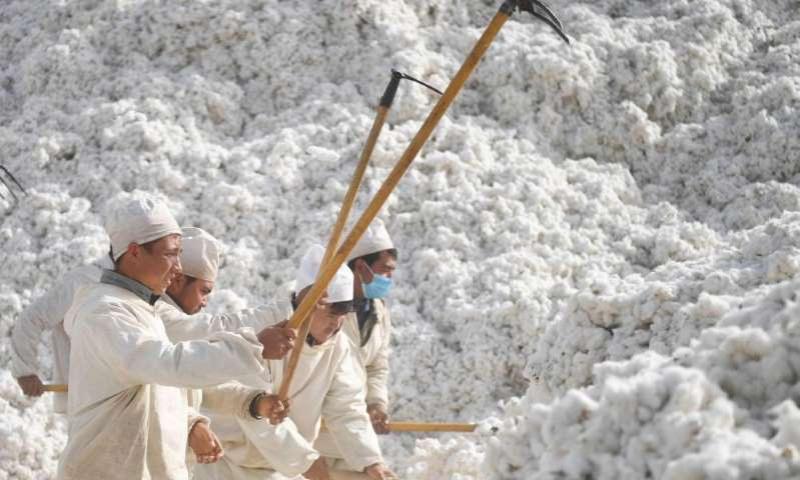'Virtually entire' fashion industry complicit in Uighur forced labour, say rights groups



Many of the world’s biggest fashion brands and retailers are complicit in the forced labour and human rights violations being perpetrated on millions of Uighur people in the Xinjiang region of northwestern China, says a coalition of more than 180 human rights groups.
There is mounting global outrage over the atrocities being committed against the Uighur population in the region, including torture, forced separation and the compulsory sterilisation of Uighur women.
Despite these abuses, the coalition of human rights groups says many of the world’s leading clothing brands continue to source cotton and yarn produced through a vast state-sponsored system of detention and forced labour involving up to 1.8m Uighur and other Turkic and Muslim people in prison camps, factories, farms and internment camps in Xinjiang. It says that the forced labour system across the region is the largest internment of an ethnic and religious minority since the second world war.
China is the largest cotton producer in the world, with 84% of its cotton coming from the Xinjiang region. Cotton and yarn produced in Xinjiang are used extensively in other key garment-producing countries such as Bangladesh, Cambodia and Vietnam. Xinjiang cotton and yarn are also used in textiles and home furnishings. This week the New York Times reported that factories in the region were also supplying face masks and other PPE to countries around the world.
The coalition has published an extensive list of brands it claims continue to source from the region, or from factories connected to the forced labour of Uighur people, including Gap, C&A, Adidas, Muji, Tommy Hilfiger and Calvin Klein.
The coalition says many more leading clothing brands also continue to maintain lucrative strategic partnerships with Chinese companies, accepting subsidies from their government to expand textile production in the region or benefiting from the forced labour of Uighur people transferred from Xinjiang to factories across China .
“There is a high likelihood that every high street and luxury brand runs the risk of being linked to what is happening to the Uighur people,” says Chloe Cranston, business and human rights manager at Anti-Slavery International.
In a call to action, the coalition, which includes more than 70 Uighur rights groups, anti-slavery organisations and labour rights campaigners, says the global apparel industry must eradicate all products and materials linked to forced labour in Xinjiang within a year.
“Global brands need to ask themselves how comfortable they are contributing to a genocidal policy against the Uighur people. These companies have somehow managed to avoid scrutiny for complicity in that very policy – this stops today,” said Omer Kanat, executive director of the Uyghur Human Rights Project.
According to the Worker Rights Consortium (WRC), one of the signatories of the call to action, brands have no credible way of proving that their supply chains from the Xinjiang are free of forced labour.
“Forced labourers in the Uighur region face vicious retaliation if they tell the truth about their circumstances. This makes due diligence through labour inspections impossible and virtually guarantees that any brand sourcing from the Uighur region is using forced labour,” said Scott Nova, executive director of the WRC.
“An apparel brand that claims to know, with confidence, that all the farms and factories it uses in the region are free of forced labour is either deeply cynical or misinformed.”
In April, the Global Legal Action Network (Glan), a group of human rights lawyers, also provided evidence to HMRC that brands including Muji, Uniqlo, H&M and Ikea were selling products in the UK containing cotton and yarn from the Xinjiang region. Glan argued that the UK government should halt sales of products linked to forced labour across the region as it breached several UK laws including the 1897 Foreign Made Goods Act.
In response, H&M and Ikea said they would stop buying cotton from the region. In an updated statement to The Guardian, H&M said that it had an indirect relationship with one yarn producer operating in the region but said it was reviewing the relationship.




Slavery is alive and well in 2020
Yep...China has no qualms about subjecting people to slavery, and most people in the fashion industry are liberals who don't seem to care.
It’s interesting that so many who are quick to boycott a company like chick filet over words, are perfectly happy to not only purchase, but actively support multinational companies like Nike that profit from slavery.
SINFUL!!!! DAMN CHINA FOR DOING THAT!!!
Any photos of the slaves working under guards with whips, guns, are the people chained to their workstations? Where is evidence of the allegations?
By the way, if anyone wants to know who posted this seed, just click on the " s " at the top of the page and it will open Sean Treacy's profile.
It’s the guardian, a liberal newspaper from England, a country with strict libel laws.
[deleted]
All I asked for was the evidence that they based their article on. Just would like to see the truth. Certainly you can't deny that there's been a lot of fake news in the media - why else would we need MBFC or Snopes?
I'd like to respond but anything that is slightly critical of your reasoning is censored.
we don't need either one. both are biased
but snopes? that is laughable.
SINFUL!!!! DAMN CHINA FOR DOING THAT!!!
“There is mounting global outrage over the atrocities being committed against the Uighur population in the region, including torture, forced separation and the compulsory sterilisation of Uighur women.“
If that’s not worth damning a country for, what is? It’s straight from the playbook of the third reich, and I haven’t forgotten what happened there.
Denial of the truth doesn't invalidate the validity of the proof.
That's it! I'm going naked from now on.